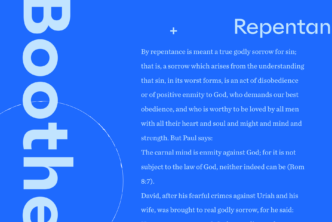
“For the word of God is living and active” (Heb. 4:12). This confession is the touchstone for this course. God acts by speaking; his word does what he says. God says, “Let there be light,” and the sun shines. He says, “Lazarus, come out” and “Little girl, get up,” and the dead are raised.
This requires a reorientation of the way we think about reading Scripture. It is not enough to ask, “What does this text mean?” (indispensable though that question is). An encounter with the alive and active Word invites us to ask, “What is God doing?” This reframes the way we think about reading—it is not primarily we who interpret Scripture; it is God who acts through his Word to interpret us.
Reading, then, is listening; it is God speaking, and it is me hearing. Within this “hermeneutics of hearing,” doctrine begins and ends with reading Scripture. What I mean is this: doctrine is like a circular stream—it flows from scriptural interpretation, and it flows back to scriptural interpretation. In other words, theology comes from reading the Bible, and its purpose is to return us to the Bible as better readers. To consider this relationship between Scripture and doctrine, this course will explore the character and content of the Bible, the relationship between the Old and New Testaments, the process and history of interpretation, a number of case-studies demonstrating the biblical basis for doctrinal formulations, and, conversely, how doctrinal formulations can aid biblical interpretation. The basic refrain, however, will be that Scripture is God speaking, reading is listening, and doctrine is a hearing aid.
Another way to put this is to say that Scripture is God doing something, and reading is having something done to us. Scripture is the voice of the risen Jesus, spoken in the power of the Holy Spirit and through human words, to give afresh the one who, as Paul confessed, “loved me and gave himself for me” (Gal. 2:20). Scripture, in other words, is Jesus speaking to give himself—the creator “addressing creatures through creatures” (J. G. Hamann). According to Rom. 11:32, God is in the business of “consign[ing] all to disobedience, that he may have mercy on all.” The agent of this double action is the “two-edged” Word (Heb. 4:12)—a Word that kills and makes alive (1 Sam. 2:6). Since we heard the lie, “you will be like God” (Gen. 3:5), we have been casting ourselves in the role of saviors and speakers. But through Scripture, God encounters us with a “two-edged” Word that exposes this illusion, returns us to our creaturely role of hearing and receiving, and gives us the Giver, the Speaker, the Word (see John 1:1–18).
* * *
Learn more about Knox Theological Seminary’s DMin program with Logos.




